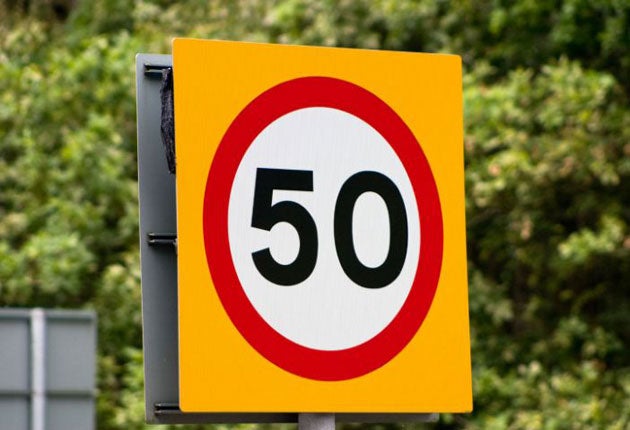Rural speed limits may be reduced to 50mph

Your support helps us to tell the story
From reproductive rights to climate change to Big Tech, The Independent is on the ground when the story is developing. Whether it's investigating the financials of Elon Musk's pro-Trump PAC or producing our latest documentary, 'The A Word', which shines a light on the American women fighting for reproductive rights, we know how important it is to parse out the facts from the messaging.
At such a critical moment in US history, we need reporters on the ground. Your donation allows us to keep sending journalists to speak to both sides of the story.
The Independent is trusted by Americans across the entire political spectrum. And unlike many other quality news outlets, we choose not to lock Americans out of our reporting and analysis with paywalls. We believe quality journalism should be available to everyone, paid for by those who can afford it.
Your support makes all the difference.Speed limits on most single-carriageway roads in rural areas could be cut from 60mph to 50mph under a Government plan to cut the number of deaths in car accidents.
Road safety minister Jim Fitzpatrick has noted figures suggesting crashes were more likely on rural parts of the road network, upon most of which the national speed limit of 60mph applies.
The UK had one of the best road safety records in the world but that has slipped in recent years. In 2007, there were 2,946 deaths and 30,000 serious injuries on the roads. Speed was deemed a factor in 29 per cent. The Government is holding a consultation on the plan, which is likely to be widely opposed.
Edmund King, the president of the AA, who will meet Mr Fitzpatrick and Transport Secretary Geoff Hoon to discuss the issue, said a blanket reduction of speed limits would not make roads safer, given that many accidents on rural roads involved only one car.
"It will not solve the problem – you have to look at the detail a little closer," he said. "Almost every weekend we see these solo car accidents. They're nothing to do with the speed limit. They're to do with inexperienced drivers driving recklessly. For a minority of reckless drivers, the rest are punished. A blanket reduction could lead to some roads having a lower speed limit than necessary. That could lead to dangerous overtaking. The best speed limits are those motorists respect and accept."
Local authorities have the power to impose lower speed limits, he added.
A Department for Transport spokeswoman said: "This is being looked at, but no decisions have been taken."
Shadow Transport Secretary Theresa Villiers said: "Rather than across the board reductions in the speed limit that hit the most responsible drivers, we believe a strategy to make our roads safer needs to target problem drivers."
Join our commenting forum
Join thought-provoking conversations, follow other Independent readers and see their replies
Comments